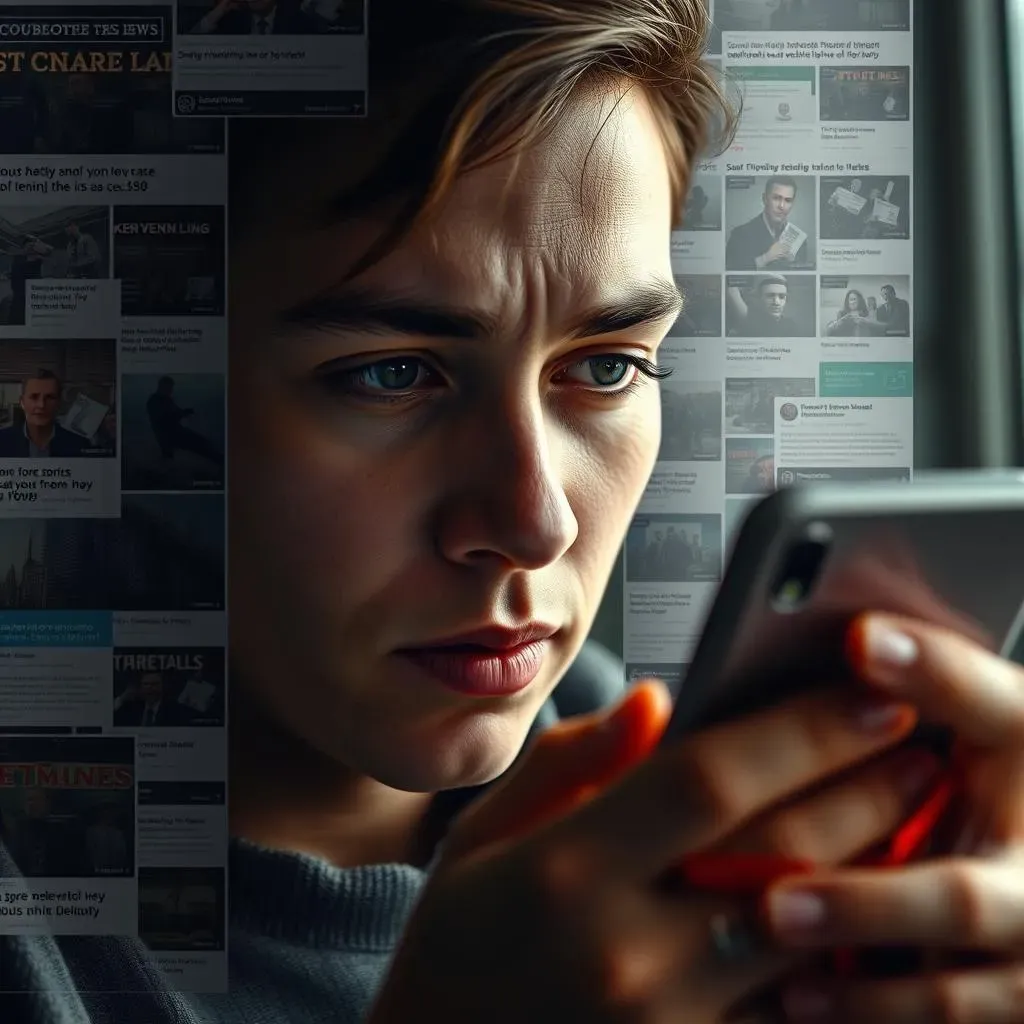Table of Contents
We live in a world where a tweet from a celebrity can reach millions faster than a breaking news alert. But what happens when that tweet, or that Instagram post, isn't just sharing a new movie or a fashion trend, but is actually spreading misinformation? This is the dangerous reality of celebrity misinformation campaigns exposure. It's not just about a famous face saying something incorrect; it's about how that inaccuracy can rapidly snowball into widespread belief, affecting everything from public health to political discourse. In this article, we'll explore why celebrity endorsements of false information are so powerful, how these campaigns take hold in our digital age, and most importantly, what we can do to become more informed consumers of information. We'll unpack how the allure of fame can blind us to the truth, the specific tactics used in these misinformation campaigns, and what tools and strategies can help us resist their influence. Get ready to understand the real impact of celebrity misinformation campaigns exposure and how to navigate this complex landscape.
The Allure and Peril of Celebrity Influence on Information

The Allure and Peril of Celebrity Influence on Information
Okay, so picture this: a celebrity, someone you admire, someone you see as successful and cool, starts talking about a new "miracle cure" or a "secret truth" they've discovered. It's like they're sharing a personal revelation, right? That's the allure. We're drawn to them because they’re famous, and we often subconsciously assume that they know more than we do. This is the core of the problem. It's not just about their fame; it’s about how that fame translates into perceived authority, even when they're speaking outside their area of expertise. The peril is that this perceived authority can lead people to accept misinformation without question. It's like a shiny object distracting us from the facts, and before you know it, a false idea is spreading like wildfire.
It's not like celebrities are always trying to be malicious; sometimes, they’re just as caught up in the hype. They might genuinely believe what they're sharing, or they might be promoting something for their own benefit. But the impact is the same: their words carry a weight that the average person's don't, and that weight can crush the truth. The problem is that we tend to form parasocial relationships with celebrities. We feel like we know them, which makes us more likely to trust them, even when that trust is misplaced. This can be dangerous, because it makes us vulnerable to misinformation, and when celebrities get it wrong, the consequences can be huge.
The Allure | The Peril |
|---|---|
Perceived authority due to fame. | Misinformation spreading rapidly. |
Personal connection through parasocial relationships. | Undermining of factual information. |
Believing celebrities are experts in all areas. | Harmful consequences due to following false information. |
How Celebrity Misinformation Campaigns Take Hold

How Celebrity Misinformation Campaigns Take Hold
Alright, so we know celebrities have this crazy influence, but how exactly does that turn into a full-blown misinformation campaign? It's not just like they post something wrong and everyone blindly follows. It's a whole process, a kind of snowball effect. First, you've got the initial post or statement, which, as we discussed, carries a lot of weight just because of who it's coming from. Then, it gets amplified by social media. Think about it: a celebrity with millions of followers shares something questionable, and instantly, it's all over the place. People are sharing, commenting, and reacting, often without fact-checking a single thing. The speed at which misinformation spreads is insane, sometimes faster than the truth can catch up.
And it's not just about the initial post; it's also about how the misinformation gets repackaged and re-shared. People will take bits and pieces of the original claim, add their own spin, and spread it further. It's like a game of telephone, where the message gets more distorted with each telling. Plus, there are often organized groups or individuals who actively push these narratives, using celebrities as a kind of "legitimate" source to give their claims more credibility. They might even create fake accounts or bots to make it seem like the misinformation is more popular than it really is. It's a whole ecosystem of deception that can be incredibly hard to stop once it gains momentum.
Step | Description |
|---|---|
Initial Post | Celebrity shares misinformation, often unintentionally. |
Social Media Amplification | Misinformation spreads rapidly through shares and reactions. |
Repackaging and Resharing | Distorted versions of the misinformation are created and further spread. |
Organized Pushing | Groups or individuals actively promote the misinformation, using celebrities as a "legitimate" source. |
Combating Celebrity Misinformation Campaigns: What Can We Do?

Combating Celebrity Misinformation Campaigns: What Can We Do?
Sharpening Our Critical Thinking Skills
Okay, so we've seen how easily misinformation can spread, and it might feel a bit overwhelming. But don't worry, there's plenty we can do! The first and most important thing is to become better critical thinkers. This means not taking everything we see or hear at face value, especially if it's coming from someone famous. Instead of just reacting, we need to pause and ask ourselves, "Does this make sense?" "Is this person an expert on this topic?" "Where is this information coming from?" It's about developing a healthy dose of skepticism, and that's a skill that gets better with practice. You wouldn't trust a plumber to give you medical advice, so why would you trust a celebrity with no expertise on a complex issue? It's all about thinking before believing, and that's a superpower we all have.
Fact-checking is your best friend in the fight against misinformation. Before you share something, take a few seconds to look it up on a reliable fact-checking website. There are tons of great resources out there that can help you quickly verify whether a claim is true or false. This isn't about being a know-it-all; it's about making sure we're not accidentally helping to spread harmful information. Think of it like this: if you’re unsure about something, it’s better to double-check than to spread something that could hurt others. Being responsible with the information we share is important, and fact-checking is our shield against the misinformation monster.
Understanding Media Literacy
Beyond critical thinking, we need to level up our media literacy. This means understanding how different media outlets work and how they can sometimes be biased or even misleading. Not all news sources are created equal, and some are more trustworthy than others. Learning to identify reliable sources is a crucial part of defending against misinformation. Consider the source. Is it a well-known, reputable news organization? Or is it some random blog or social media account with no track record? Understanding the difference is key. And remember, headlines can be sensationalized to grab your attention, so always look beyond the headline and read the whole article or watch the entire video before forming an opinion.
Being media literate also means understanding the different kinds of media. A meme, for example, might be funny, but it's not exactly a reliable source of information. The same goes for short video clips or out-of-context quotes. These things can be easily manipulated to spread misinformation, so we need to be extra careful. It's like learning to read between the lines, not just taking things at face value. And if something sounds too good to be true, it probably is. So, be aware, be critical, and be smart about what you consume and share. Media literacy isn't just a skill; it's a responsibility in today's world.
Action | Description |
|---|---|
Fact-Checking | Verify information on reliable fact-checking websites. |
Source Evaluation | Identify and trust reliable news sources. |
Media Awareness | Recognize different media types and potential biases. |
Promoting Responsible Sharing and Reporting
Finally, we have a responsibility to be part of the solution and not the problem. This means being thoughtful about what we share online. Before you hit that share button, ask yourself: "Am I sure this is true?" "Could this harm anyone if it's false?" "Am I just sharing this because it confirms my own biases?" It's like being a good neighbor in the digital world. If we all commit to sharing only accurate information, we can make a real difference in slowing down the spread of misinformation. And if you see something that looks suspicious, don't be afraid to report it. Many social media platforms have reporting mechanisms, and they can be used to flag potentially harmful content. It's not about being a snitch; it's about protecting the community from false information.
We also need to have conversations with the people around us. If you see a friend or family member sharing misinformation, gently try to point it out and share some helpful resources. It's not always easy, but it’s important to approach it with empathy and understanding. People often share misinformation because they don't know any better, not because they're trying to be malicious. By having open and honest conversations, we can help each other become more informed and more resistant to misinformation. It’s a team effort, and together, we can build a more informed and truthful online world.